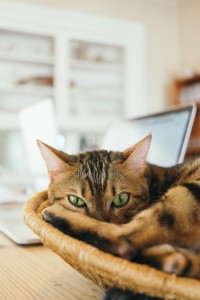September seems to be cat month at Karingal Vet Hospital! Last time, we talked to you about why people bring their cats to the vet; this week, we’re talking to you about the dangers of overfeeding your feline friend.
Overfeeding may be the most common nutritional problem we see in cats. It can cause many life-shortening health problems, including obesity, diabetes, high blood pressure, liver disease and some forms of cancer. Arthritic pets that are overweight experience greater strain on sore joints and are therefore in much more pain.
It’s easy to overfeed your pet. People often reward their animals with food treats. Owners sometimes feel that they only connect with their cat through food and so are more inclined to overfeed. This is unhealthy for the pet. Small amounts of overfeeding can add up and these behaviours can be difficult to change.
Feline obesity occurs when cats take in more energy than they are using. Most indoor cats require much less energy than owners often think. For a 5kg indoor cat, a diet of 200kcal per day should be enough.
Your cat weight management regime will change during your pet’s life. As they get older and expend less energy, they will require less food. After desexing, similarly, although their appetite may go up, their metabolism will go down, meaning, again, they require less food.

When it comes to obesity in pets, prevention is the best cure. Unlike with dogs, it can be difficult to implement fat-burning exercises with cats, so knowing how much food to give a cat is the best way to treat feline obesity.
Do not leave dry biscuits out for your cat to snack on throughout the day. Animals are not very good at portion control, and are likely to overfeed themselves given the opportunity. Cats only need two meals a day. Divide the recommended daily portion of cat food into two: one in the morning and one for the evening. To minimise your cat’s anxiety levels, try to keep these two meals at the same time every day.
Cats are carnivorous, they have evolved to take most of their nutrients from animals they hunt. This means that their diets require high protein and low fat content. Although cats can eat carbohydrates, they don’t need to for energy, and they haven’t evolved to have very carbohydrate-heavy meals.
Cats also do not need sugars. In fact, their digestion doesn’t metabolise fructose or other sugars. Avoid giving your cat sweet things. Feeding your cat sweets can lead to diabetes, obesity, arthritis, dental issues and premature death.
There are a number of weight loss cat foods on the market. We recommend Hill’s Prescription Diets as your cat food best designed to help get weight off. Hill’s make a number of very good diets such as Metabolic and M/D that are produced specifically to aid in weight loss. Our team can recommend the best diet for your cat.
If you want to talk about cat weight management, need some tips on how to help your cat lose weight , or are concerned you might be overfeeding your cat, contact us today. Our cat care experts are here to help.
While you’re here, why not read some of our other blogs, or check out some of our acupuncture or laser therapy or cryotherapy treatments? And remember, although it is no longer dental disease awareness month, it’s still as important as ever to take care of your pet’s teeth.